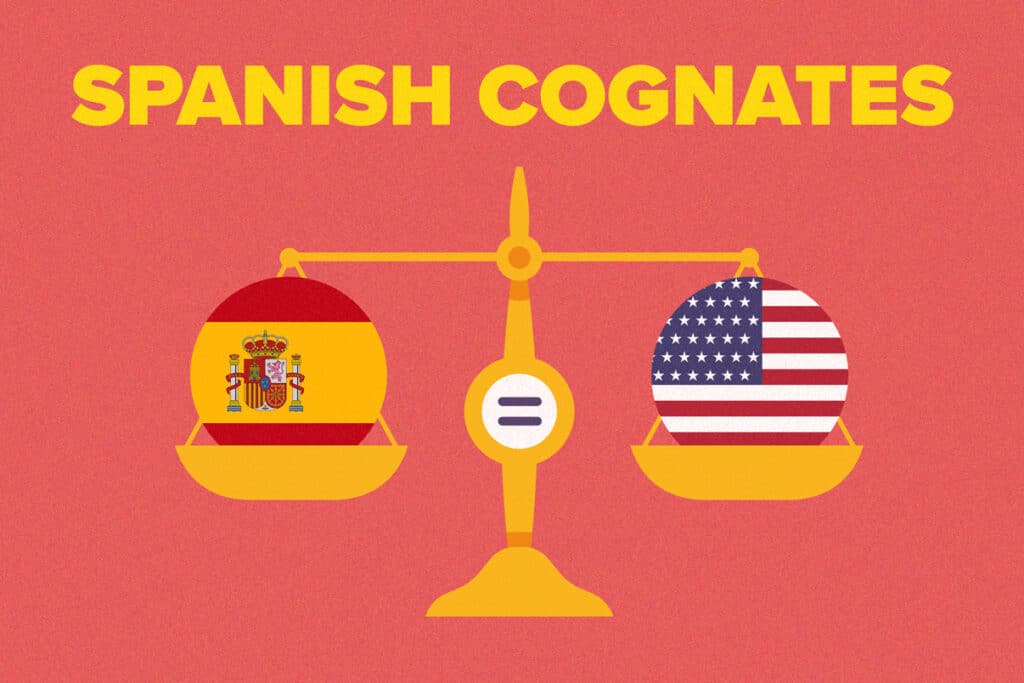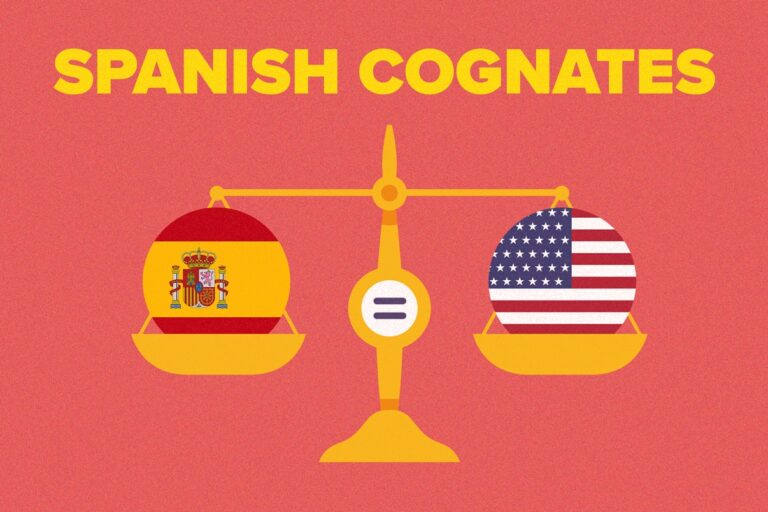
Even if today is your first day learning Spanish, you already know plenty of Spanish words.
Actor, animal, bar, color, control… You know them in English, but they’re in italics here because they’re all Spanish cognates!
Spanish and English have many such “twins,” and taking advantage of them will speed up your Spanish learning considerably.
Let’s look at some more words that look exactly (or almost) the same in English and Spanish.
Contents
Download:
This blog post is available as a convenient and portable PDF that you
can take anywhere.
Click here to get a copy. (Download)
What Are Spanish Cognates?
Cognates are words that look identical or similar in two languages and have the same meaning.
English and Spanish have borrowed many words from each other. This is helpful for English-speaking learners of Spanish (and vice versa)!
Cognates are the easiest way to expand your vocabulary. Just a quick look at the word, and you know its meaning.
But even though they look similar, there are often some differences in stress and pronunciation.
Beware of false cognates, though!
Often called “false friends,” these are words that look like cognates but aren’t. We have a full post explaining these here that you can check out after reading this one.
Most Common Spanish Cognates
Perfect Spanish Cognates
These words are spelled exactly the same way in English and Spanish. And because they’re cognates, they mean exactly the same thing too.
The only difference you may see in perfect Spanish cognates is the inclusion of an accent mark.
And remember to listen for changes in pronunciation!
Near-perfect Spanish Cognates
These near-perfect cognates have very similar spelling in both English and Spanish, though they’re not exact matches.
You can probably still guess the meaning of the word just by looking at the Spanish form!
Spanish Verb Cognates
The Spanish verb cognates below also have very similar spelling to their English counterparts.
Verb cognates are particularly valuable to learn because they’re so versatile. They can even become adjectives by using the past participle form (remove the -ir, -er or –ar and add an -ido or -ado).
Learning Spanish verb cognates vastly expands your functional vocabulary.
Rules and Patterns for Spanish Cognates
Knowing the patterns cognates follow makes it much easier to take an educated guess when you’re not sure of a word!
For example, if you aren’t 100% sure how to say “professional” in Spanish during a conversation, you might say profesional because you know the Spanish cognate patterns—and in this case, you’d be correct.
Here are the most common patterns for Spanish cognates that you should commit to memory:
| English Ending | Spanish Ending | English → Spanish |
|---|---|---|
| -ant | -ante | Important → importante |
| -al | -al | Professional → profesional |
| -ar | -ar | Popular → popular |
| -ary | -ario | Ordinary → ordinario |
| -ate | -ar | Activate → activar |
| -ble | -ble | Incredible → increíble |
| -ct | -cto | Perfect → perfecto |
| -ic | -ico | Fantastic → fantástico |
| -id | -ido | Rapid → rápido |
| -ify (verbs) | -ificar | Simplify → simplificar |
| -ile | -il | Fragile → frágil |
| -ism | -ismo | Organism → organismo |
| -ist | -ista | Tourist → turista |
| -ity | -idad | Curiosity → curiosidad |
| -ive | -ivo | Effective → efectivo |
| -ly | -mente | Exactly → exactamente |
| -ment | -mento | Document → documento |
| -nce | -ncia | Experience → experiencia |
| -nt | -nte | Intelligent → inteligente |
| -or | -or | Author → autor |
| -ous | -oso | Delicious → delicioso |
| -sion | -sión | Decision → decisión |
| -tion | -ción | Exception → excepción |
| -ony | -onia or -onio | Ceremony → ceremonia, or matrimony → matrimonio |
| -ory | -io | Laboratory → laboratorio |
| -um | -o | Museum → museo |
| -us | -o | Radius → radio |
Learning cognates can be a cool way of improving your Spanish vocabulary with little effort.
And now you’re 94 words closer to becoming a proficient speaker of Spanish!

You can also see these words in use and discover even more Spanish cognates with programs like FluentU. The interactive subtitles let you double-check the meaning of each word in every video you watch, so you don’t have to worry about “false friends.”
As always, happy studying!
Download:
This blog post is available as a convenient and portable PDF that you
can take anywhere.
Click here to get a copy. (Download)



